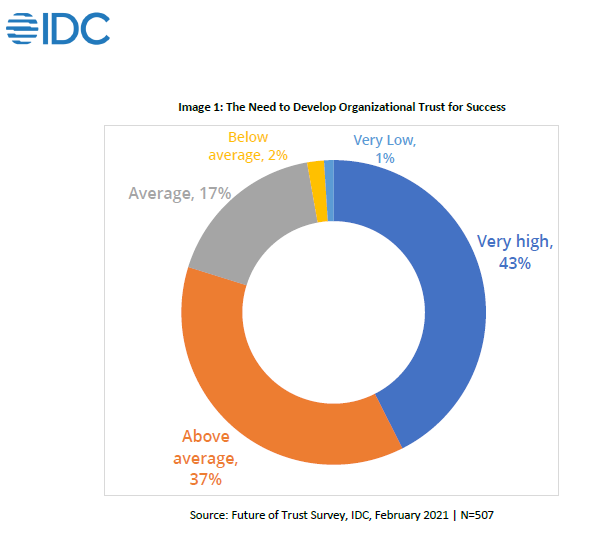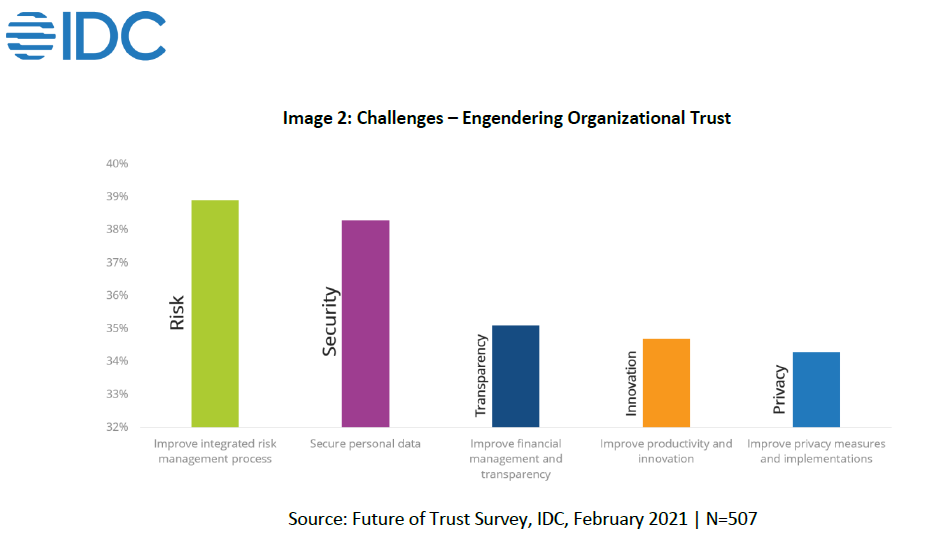In IDC’s Future of Trust online survey, 80% of 507 respondents across seven countries indicated that the need to engender organizational Trust, internally and externally, is very high or above average.

Why is This the Case?
We live in a digital infodemic world. Information Pandemic – Infodemic – is an abundance of information including false or misleading information in digital and physical environments typically seen during a disease outbreak. We have been unknowingly susceptible to a constant state of infodemic and the complexities stemming from it. This infodemic, especially in digital, form results in confusion, a lack of transparency, risk taking behaviors, and mistrust between two or more entities. As a technology provider, protecting data based on its sensitivity while keeping in line with the rate at which data is created, sourced, curated, and stored is a complex task. As an individual – consumer, customer, employee, or student – it is nearly impossible to keep track of how the digital footprint from online activity is used to further influence our profiles.
Why is Organizational Trust Important?
A good brand and reputation are built on an organization’s commitment to, and delivery on, core values of honest business practices that are based on protecting employees, customers, consumers, and business partners. Core values that are steeped in the idea that a business does not need vast troves of personal data to succeed engender a good brand and reputation – and, in turn, Trust. For example, an organization can consciously incorporate the following core values as a conscious way to battle the infodemic and ensure harden best business practices:
- Incorporate privacy policies that are transparent, simple, and short
- Limit or minimize data collection regarding their users
- Always act in the best interest of the consumer
These core values will reflect an organization’s commitment to good governance and best business practices that are culturally embedded in the organization – from senior leadership to junior staff. The result is a Trusted brand, which often leads to sustained business and profitability. With core values such as these, there are often factors that drive initiatives and investments with several challenges along the way.
Below, I outline several drivers, challenges, and areas of investment identified in our Future of Trust primary research study conducted in early 2021.
Drivers, Challenges, and Areas of Investment for Improving Organizational Trust
Top Five Drivers
Through conversations with technology providers, enterprises, and individuals, I believe the market is seeing an increased focus on engendering organizational Trust. With several industry and regional regulations that are increasingly focused on privacy, I find that organizations are increasingly focused on improved risk assessment and mapping to better secure personal data. Our survey validates this finding further with risk and securing personal data as top two drivers. Good governance through transparency, improved innovation and productivity, and improving privacy are other key Trust drivers.
Top Three Challenges
As the chart below indicates, the top three challenges for engendering organizational Trust are:
- Increasingly sophisticated cybersecurity attacks
- Increasing and complex regulatory requirements
- Fragmented IT & security infrastructure
I conducted in-depth interviews with security and privacy professionals across several industries who share the same concerns. Talking about the regulatory compliance complexity, the CISO of a Massachusetts-based pharmaceutical company said, “If you were compliant with this regulation, you were in violation of another, and so you played the shell game the whole time because you could not ever meet everybody’s expectations. It was impossible.” This complexity will only increase as India and other countries develop and implement privacy bills to protect sensitive and secret personal data. The proliferation of multi/hybrid clouds in addition to on-premises disparate infrastructure, makes managing this infrastructure with improved security measures a complicated task. Addressing the use of public cloud services and the need for confidentiality and privacy, another CISO of a pharmaceutical company said, “You’re trusting these folks that their infrastructure and separation is performing the way it’s supposed to perform, but you have no real way to validate that because you can’t see beyond your borders, right?“

2021 Areas of Investments
The above-mentioned challenges call for investments. Here are specific investment areas that organizations are undertaking to address the challenges in 2021.
- Risk: The top risk related investment area is to Identify and assess existing, new, and emerging risk factors. This not only allows business to be better prepared for any impending or new risks, but it also enables organizations to react accordingly and potentially minimize or even prevent losses.
- Security: Organizations will leverage significantly higher AI and analytics in cybersecurity processes to tackle increasingly sophisticated and frequent cybersecurity attacks.
- Compliance & Privacy: Organizations will try to go above and beyond achieving and proving compliance and in doing so they will evaluate which data types (public, privacy, sensitive and secret) are collected, whether they should they be collected, and specifically how such information is protected.
- Ethics: Organizations will invest in defining and implementing ethical uses of data in a way that protects consumers, customers, employees, individuals, and society at large. While ethics is not embodied in any regulation, the core values of an organization will define what ethical use of data means to a given business.
My Future of Trust research further indicates that 2021 will see further investment in new hires that will be responsible for security, privacy, corporate social responsibility, compliance, and risk. I will continue to publish Future of Trust insights from the survey in the coming weeks.
What Do You Think?
Please reach out with questions, comments, or suggestions. I look forward to hearing from you at apotnis@idc.com. You can also download our latest Future of Trust eBook, Confidential Computing, Part 1: Extending the Circle of Trust to Public Clouds:




